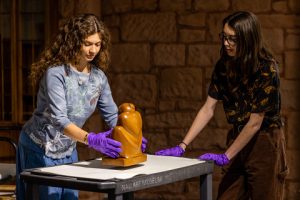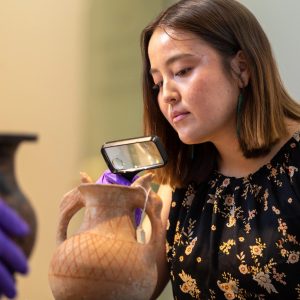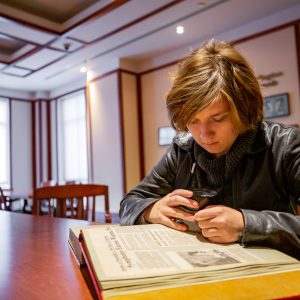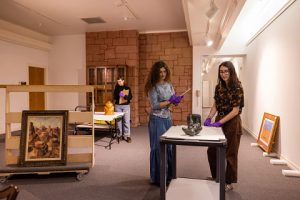Internships
Internships provide students with hands-on career experience, an invaluable resource to learn more about your field and determine your future goals. CCS does not place students in internships but we can assist in finding opportunities. On campus and Flagstaff opportunities are announced via email and regional/national internships are often shared on the CCS LinkedIn. Internships require not only internship hours on site but also include additional departmental requirements. Students may not retroactively use past experiences or opportunities to meet these requirements and should be enrolled in CCS 408 credits during the semester they are completing an internship for a CCS program.
For more information, please contact your academic advisor and the CCS Internship Coordinator Dr. Diana Murtaugh Coleman. Students interested in museum studies or arts & cultural management internships may contact Dr. Becky Pratt-Sturges, coordinator for these programs, for more information regarding opportunities specific to these fields. We recommend that students pursue internships during their third and fourth years at the university or once they have achieved junior status.
The following programs require at least 1 three credit hour internship paid or unpaid (135 hours):
- Minor in Museum Studies (or students may take an applied course with approval from Dr. Pratt)
- B.A. Comparative Cultural Studies (or students may take MST 460 or complete an independent study with a faculty member CCS 497)
- Minor in Arts & Cultural Management (or students may take an applied course with approval from Dr. Pratt)
Students may complete internships during any semester (including summer) and may do a combination of credits, such as 1 credit (45 hours) during 3 semesters or 2 (90 hours) credits for one semester and 1 credit for another semester.
Internships are recommended for:
- All students! In CCS, internships are especially recommended for students in all of the disciplines we include, such as humanities, comparative study of religions, and art history as well as museum studies.
- Internships are essential for cultural heritage careers in museums, archives, libraries, universities, nonprofits, corporations, and government.
Have a question about internships in CCS? Email Dr. Coleman or Dr. Pratt.
Dr. Diana Coleman is the Internship Coordinator for the department of Comparative Cultural Studies.
Dr. Becky Pratt-Sturges is the coordinator for the Museum Studies and Arts & Cultural Management minors in Comparative Cultural Studies.

What can an internship do for you?
Internships are not just about fulfilling credits; they are about gaining hands on experience and applying what you learn in your classes to the professional world.
Internships:
- give students the opportunity to learn more about the kinds of work available in a variety of institutions.
- give students an idea of the kind of work they would like to do and that they would not like to do.
- give students specific experience in a particular area of the organization.
- teach students how to be professionals and how to manage the professional expectations of a workplace.
- introduce students to the culture of the field and bring students into the professional network of the field associated with the internship, such as museums, art, nonprofit management, social media, marketing, etc. and provide opportunities to learn from professionals directly.
- provide training that is not as available in our programs or training tailored to your career goals and interests.
- encourage students to learn more about their communities or if they travel for an internship, the community of the internship. Communities make up the audiences for the cultural heritage field and thus are essential to the success of local and regional organizations in particular.
In a competitive career market, internships can provide much needed experience as well as expand your network so that you are aware of jobs as well as sometimes even lead an employer to reach out to you because of a recommendation or because you interned with them!
Opportunities in museums and cultural heritage sites are in a variety of areas and are not limited to curatorial positions. They include:
- Curatorial/Collections Management: interns may conduct provenance and contextual research on objects in the permanent collection, participate in decisions regarding display in galleries and for exhibits, be a part of exhibition design and installation, and write content for labels or other forms of interpretation.
- Communications/Public Relations: interns may be part of campaigns to advertise the organization in digital and print formats, compose content for different platforms about exhibitions, events, or to raise interest in the permanent collection, and may also create text content for visitors, such as brochures.
- Education: Educational programming is essential in museums and interns may participate in a variety ways within an education unit including but not limited to: developing programs and content for audiences of all ages, lead tours of the museums for different audiences, work with docents (volunteers) and assist with event coordination.

Students in Museum Studies are not limited to internships just in museums and students in public humanities, art history, and religious studies are eligible for museum internships as well.
Additional kinds of internships for our majors and minors include:
- Archival internships in collections management, digital preservation and curation, and electronic records management. Students may also participate in conservation, curatorial, or discovery internships or in specific projects. Other opportunities may include digital and print outreach, marketing, or providing general administrative support.
- Public humanities internships are often with a variety of organizations locally (such as Creative Flagstaff or the Flagstaff Symphony Orchestra), regionally (Arizona Humanities Council), nationally (Smithsonian), or even internationally and are often project specific. They can include digital outreach, digital humanities project development, collection and audience research, education opportunities, marketing, and other opportunities depending on the project.
- Digital humanities internships focus on digital data management, digital project development, and digital storytelling. Often instruction in technology is provided but some experience often helps students get these opportunities.
- Cultural heritage general internships are limitless. Sometimes these can include opportunities to work for an arts or history focused private organization (rather than nonprofit) or the application of cultural competencies in an educational environment, or another way of applying what you have learned in your classes in the workplace.
Students should consult the CCS Internship Coordinator and/or Museum Studies Coordinator about any opportunity they consider applying to.
Finding Internships
Unfortunately, the department cannot place students in internships. Students are responsible for finding internships in consultation with their faculty mentor and the internship coordinator. We can help you find internships in many cases, as well as assist with your applications (with reasonable advance notice). A limited amount of internship opportunities may be available to work with Dr. Pratt on digital and/or physical exhibits. Dr. Pratt also sends out opportunities via the CCS listservs so check your email! Many regional and national internships are posted to the CCS LinkedIn.
Students should:
- start looking for internships at least a semester in advance and ideally a year in advance of the semester you wish to complete your internship.
- reach out to organizations they are especially interested in interning with, especially if they do not list internships on their websites. This does not mean they are not interested in interns, especially small and local organizations.
- consider internships outside of your specific interests so you can explore different career options.
- consider what you have to offer an organization and emphasize that in your application materials.
- apply using professional cover letters and resumes.
- conduct yourself professionally in all interactions with any organization’s staff and personnel. This include responding in a timely fashion to emails.
- acknowledge that most internships will not be paid. It isn’t fair but it is the way it is, at least for now.
- consider any limitations you might have, such as geography, available hours, etc. before you apply for internships. Look for ways to expand your options if at all possible.
- check your university email regularly for opportunities sent to you by the Internship Coordinator or Museum Studies Coordinator.
CCS students in Flagstaff have interned at the following local organizations in a variety of positions:
Comparative Cultural Studies with various faculty members. Dr. Pratt sometimes has digital humanities internships available.
Martin Springer Institute These are advertised by CCS on our listservs and social media.
Cline Library Special Collections and Archives
Clara M. Lovett Art Museum (NAU) These are advertised by CCS on our listservs and social media.

If you live elsewhere during the summer, you might also research into internships near you. CCS students have interned at the following organizations in Phoenix and Tucson:
Scottsdale Contemporary Museum of Art
National Internships Notable national internships awarded to CCS majors and minors include several student interns at the Metropolitan Museum of Art. Many major organizations offer competitive internships that are usually paid (but not always) with specific deadlines for applications. Here are just a few:
The Metropolitan Museum of Art
American Museum of Natural History
National Endowment for the Humanities
Metropolitan Museum of Art Summer Institute
School of Advanced Research, Indian Arts Research Center (IARC)
Archives of American Art Internship
National Museum of the American Indian
U.S. Department of State Internship Program
National Park Service Heritage Documentation Program
Schomburg-Mellon Humanities Summer Institute

Internship Requirements
Internships are more than what students do on site. CCS has specific requirements for internships.
- Students will enroll in CCS 408/MST 408 credits during the semester of the internship.
- Internships will meet the student learning outcomes for internships in CCS, which include professional preparation, knowledge and application of concepts learned in CCS classes to professional work and/or demonstrate their ability to conduct research in a professional setting, and to contribute to the professional growth of students by integrating intellectual and professional development.
- Interns will complete timesheets each week and will email them to Internship Coordinator.
- Interns will keep a daily journal describing what you have learned and accomplished during your internship hours.
- Meet regularly with the Internship coordinator pre-decided days and times.
- Present a final report of your work in a document to the Internship Coordinator near the end of the semester.
- Present in the CCS Internship Showcase near the end of the semester.
- Receive evaluation and comments from your site supervisor at the end of the semester.
Internship Enrollment
Students should reach out to the Internship Coordinator the month before the semester during which they want to complete their internship to prepare the necessary paperwork with CCS, the university, and the site of their internship. CCS will then enroll the student in CCS 408 or MST 408 credits.
Teaching Assistantships
CCS upper-division students with a minor or focus in Comparative Study of Religion may apply to be teaching assistants in lower-division courses for internship credit. For more information, please email the department to be referred to the appropriate faculty member. Paid teaching assistantships are posted to Handshake when available.